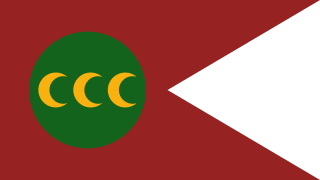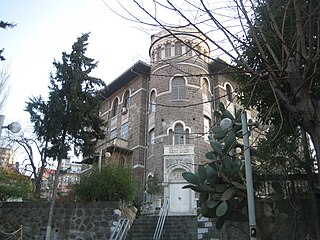Related Research Articles

The Armenian genocide was the systematic destruction of the Armenian people and identity in the Ottoman Empire during World War I. Spearheaded by the ruling Committee of Union and Progress (CUP), it was implemented primarily through the mass murder of around one million Armenians during death marches to the Syrian Desert and the forced Islamization of others, primarily women and children.

The history of the Ottoman Empire in the 18th century has classically been described as one of stagnation and reform. In analogy with 18th-century France, it is also known as the Ancien Régime or Old Regime, contrasting with the "New Regime" of the Nizam-i Cedid and Tanzimat in the 19th century.
Urban studies or pre-urban planning education is based on the study of the urban development of cities. This includes studying the history of city development from an architectural point of view, to the impact of urban design on community development efforts. The core theoretical and methodological concerns of the urban studies field come from the academic disciplines of history, economics, sociology, geography, political science, anthropology, civil engineering, environmental studies, business administration, and the professional fields of urban planning, architecture, landscape architecture, and urban design. Urban studies is a major field of study used by paraprofessional practitioners of urban planning, it helps with the understanding of human values, development, and the interactions they have with their physical environment.
Social issues in China are wide-ranging, and are a combined result of Chinese economic reforms set in place in the late 1970s, the nation's political and cultural history, and an immense population. Due to the significant number of social problems that have existed throughout the country, China's government has faced difficulty in trying to remedy the issues. Many of these issues are exposed by the Chinese media, while subjects that may contain politically sensitive issues may be censored. Some academics hold that China's fragile social balance, combined with a bubble economy makes China a very unstable country, while others argue China's societal trends have created a balance to sustain itself.

In the Ottoman Empire, women enjoyed a diverse range of rights depending on the time period, as well as their religion and class. The empire, first as a Turkoman beylik, and then a multi-ethnic, multi-religious empire, was ruled in accordance to the qanun, the semi-secular body of law enacted by Ottoman sultans. Furthermore, the relevant religious scriptures of its many confessional communities played a major role in the legal system, for the majority of Ottoman women, these were the Quran and Hadith as interpreted by Islamic jurists, often termed sharia. Most Ottoman women were permitted to participate in the legal system, purchase and sell property, inherit and bequeath wealth, and participate in other financial activities, rights which were unusual in the rest of Europe until the 19th century.

Heidi I. Hartmann is an American feminist economist who is founder and president emerita of the Washington-based Institute for Women's Policy Research (IWPR), a research organization created to conduct women-centered, public policy research. She retired from her position as President and CEO in 2019.

The İzmir Ethnography Museum is an ethnography museum in Izmir, Turkey, containing a number of pieces of clothing and pottery from the Seljuk period of Turkish history onwards. Admission to the museum is free.
Hans-Lukas Kieser is a Swiss historian of the late Ottoman Empire and Turkey, Professor of modern history at the University of Zurich and president of the Research Foundation Switzerland-Turkey in Basel. He is an author of books and articles in several languages.
Şerif Mardin was a prominent Turkish sociologist, political scientist, academic and thinker. In a 2008 publication, he was referred to as the "doyen of Turkish sociology."
Şahinde Hanım was an Abkhazian princess. She was a lady-in-waiting to Nazikeda Kadın, wife of Mehmed VI, the last Sultan of the Ottoman Empire.
Jewish women in the early modern period were a crucial part to all Jewish societies, as they made up half of the population. Living in places such as Italy, Poland-Lithuania, and the Ottoman Empire had effects on the role Jewish women played in their society. Different customs and regulations were found in various societies around the world.
The evacuation of Ayvalik took place in May 1917 as part of the genocide policies of the Ottoman government. The population of the predominantly Greek-inhabited town of Ayvalik, Ottoman Empire on the east coast of the Aegean Sea was forcibly deported to the hinterland of Anatolia by the Ottoman authorities. The deportation was organized by Imperial German Army General and chief military adviser to the Ottoman Empire, Liman von Sanders, and included death marches, looting, torture and massacre against the local civilian population.

İkdam was a newspaper in the Ottoman Empire and Turkey published between 1894 and 1928. During its lifetime it became the most popular newspaper in Istanbul.
The terminology of the Armenian genocide is different in English, Turkish, and Armenian languages and has led to political controversies around the issue of Armenian genocide denial and Armenian genocide recognition. Although the majority of historians writing in English use the word "genocide", other terms exist.
Fatma Müge Göçek is a Turkish sociologist and professor at the University of Michigan. She wrote the book Denial of Violence in 2015 concerning the prosectution of Armenians in the Ottoman Empire and Turkey, for which she received the Mary Douglas award for best book from the American Sociological Association. In 2017, she won a Distinguished Faculty Achievement Award from the university.
Lerna Ekmekçioğlu is a historian and author of Turkish–Armenian origin. She is a faculty member at MIT. She works on the history of Armenians and Turks in the 20th century.

Following the Armenian genocide, vorpahavak was the organized effort to rescue "hidden" Armenian women and children who had survived the genocide by being abducted and adopted into Muslim families and forcibly converted to Islam.
Hanımlara Mahsus Gazete was an Ottoman women's magazine which was published in Istanbul from 1895 to 1908. It was one of the long-term publications in the Ottoman Empire which shaped the literary traditions of the Ottoman women. However, due to the intensive censorship during the reign of Sultan Abdulhamit the magazine mostly featured conventional topics.
Nelly Hanna is an author whose research and publications focus on Arab and Islamic Civilizations of the period from 1500 to 1800. Her scholarly work analyzes past trends and ideologies of the Middle East and Egypt. The conclusions Hanna makes are unique compared to other scholars within her research field. Her work also calls for the continued analyzation of the Eurocentrism present within the ancient world. Her work has been influential and sparked conversation within scholarly debate. Her career has involved work as both an author to several books as well as teaching as a respected professor.
Lycée Français Saint-Michel is an international French school located in Istanbul. It is one of the three Lasallian schools in Turkey along with Lycée Saint-Joseph in Istanbul and Lycée Saint-Joseph in Izmir. The Agency for French Education Abroad (AEFE) does not include the school in its list of French international schools in Turkey.
References
- ↑ "47921588".
- ↑ "Nazan Maksudyan, Ottoman Children and Youth during World War I (New Texts Out Now)". Jadaliyya - جدلية. Retrieved 4 January 2021.
- ↑ Morrison, Heidi (2015). "Orphans and Destitute Children in the Late Ottoman Empire by Nazan Maksudyan (review)". The Journal of the History of Childhood and Youth. 8 (2): 327–329. doi:10.1353/hcy.2015.0023. ISSN 1941-3599. S2CID 142446685.
- ↑ Ertem, Özge (2015). "Nazan Maksudyan. Orphans and Destitute Children in the Late Ottoman Empire. Syracuse: Syracuse University Press, 2014, xviii + 232 pages". New Perspectives on Turkey. 53: 228–231. doi:10.1017/npt.2015.28. S2CID 147999338.
- ↑ Gundogdu, Cihangir (2017). "Orphans and Destitute Children in the Late Ottoman Empire . By Nazan Maksudyan. Syracuse, NY: Syracuse University Press, 2014. Pp. xviii + 232. $39.95 (hardcover)". Journal of Near Eastern Studies. 76 (1): 209–211. doi:10.1086/690656.
- ↑ Huner-Cora, N. Ipek (2016). "Women and the City, Women in the City: A Gendered Perspective on Ottoman History ed. by Nazan Maksudyan (review)". Journal of the Ottoman and Turkish Studies Association. 3 (1): 203–206. doi:10.2979/jottturstuass.3.1.16. ISSN 2376-0702.
- ↑ "Nazan Maksudyan, editor. Women and the City, Women in the City: A Gendered Perspective on Ottoman Urban History ". The American Historical Review. 121 (2): 701.2–701. 2016. doi:10.1093/ahr/121.2.701a.
- ↑ Iner, Derya (2017). "Women and the City, Women in the City: a gendered perspective on Ottoman urban history, by Nazan Maksudyan". Women's History Review. 26 (4): 660–662. doi:10.1080/09612025.2017.1285750. S2CID 149234078.
- ↑ Morrison, Heidi (2020). "Ottoman Children & Youth During World War I. Nazan Maksudyan, (Syracuse, NY: Syracuse University Press, 2019). Pp. 248. $60.00 cloth. ISBN: 9780815636274". International Journal of Middle East Studies. 52 (3): 580–581. doi:10.1017/S0020743820000434.
- ↑ "Ottoman Children and Youth during the World War by Nazan Maksudyan". www.europenowjournal.org.